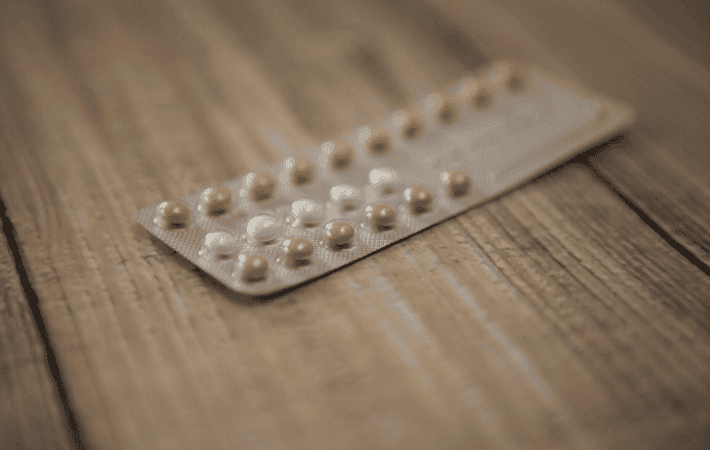We could say that if the menstruation lasts for a single day it is a kind of miracle, since it normally lasts between 4 and 8 days. However, if we should be concerned about a sudden change in our menstrual cycle.
We could assign many culprits to the reason why the bleeding lasts only one day, including pregnancy, birth control, medications, or some medical conditions. Excessive exercise, age and weight loss can also be other triggers for this imbalance that can shorten the duration of the rule .
Find out what can cause your period to last just one day .

How long should menstruation last?
When it comes to menstrual cycles, the reality is that there is no single definition of what is common, as we are all different and many factors come into play. Therefore, instead of considering specific figures (for example, a 28-day cycle with a 5-day period), it would be more appropriate to talk about ranges.
The average menstrual cycle usually lasts 28 days , however a cycle that lasts between 21 and 45 days is also considered regular. What is normal for one woman may not be normal for another, and the cycle can change throughout our lives. Between 5 and 35% of the periods are irregular and vary in length from month to month (Baek, Kim and Kwak, 2019).
The average menstrual bleeding lasts 5 days , but a bleeding of 2 to 8 days is within the normal range.
Can the period only last one day?
If a period of 2 days is still within the normal range, could we say that it is normal for your period to last only 1 day if you usually bleed for several days?
We will look at some reasons why 1-day periods are given and what you can expect.

1. Pregnancy
A short period of 1 to 2 days could be implantation bleeding, which is common during pregnancy. According to the American College of Obstetricians and Gynecologists, this happens 1 to 2 weeks after fertilization in 15 to 25% of pregnancies. It may have spotting early as the blood vessels of the cervix are developing.
2. Miscarriage
It is possible to mistake a miscarriage bleeding for a short period, especially if you don't know you are pregnant.
Bleeding can range from light spotting to heavy discharge, depending on how advanced the pregnancy is. Also, you may experience cramps or pain in your abdomen. If you have questions, consult your doctor as soon as possible.

3. Ectopic pregnancy
Ectopic pregnancy is a pregnancy in which the fertilized egg implants in a place other than the uterus. If the egg continues to grow, it can rupture the tube, which can cause large internal bleeding.
The most common symptoms of ectopic pregnancy are vaginal bleeding and pelvic pain. Seek medical attention immediately if you experience these or the following symptoms:
- Abnormal bleeding
- Dizziness or fainting
- Pressure in the rectum
- Severe pain in the abdomen or pelvis
4. Lactation
During lactation a brief menstruation may occur . In general, if you are breastfeeding, it is likely that you will not menstruate thanks to the presence of the hormone prolactin, which promotes lactation and prevents the body from having a period. However, it is common for the period to return between 9 and 18 months after the baby is born.

5. Contraceptives and other medications
Hormonal birth control pills and vaccines can make your period shorter, as their synthetic hormones thin the lining of the uterus, making menstruation less heavy. For their part, intrauterine devices (IUDs) can have the same effect.
Other medications, prescription and over-the-counter, and supplements can also cause changes in menstrual bleeding . Some of these are as follows:
- Aspirin and blood thinners
- Nonsteroidal anti-inflammatory drugs and naproxen
- Hormone therapy drugs (such as estrogen or progesterone)
- Medicines to treat cancer
- Thyroid medications
- Some antidepressants
- Herbal supplements (turmeric, ginger, ginkgo biloba, and ginseng).
If you take any of these medications and experience a change in your regular menstrual flow, see your doctor.

6. Weight loss
Losing too much weight in a short time can affect your period . Abrupt weight loss and eating disorders can cause irregular periods or amenorrhea. If this is the case for you, it is a sign that the body is not receiving the necessary nutrition to maintain its menstrual health and other reproductive functions.
7. Stress
Stress can wreak havoc on our health, especially hormones, so it can lead to a shorter or irregular period.
Think of your period as a barometer of your stress level . Once your stress drops to a manageable level, your cycle will equalize as well.

8. Thyroidism
Thyroid hormones are crucial for menstrual health . Conditions like hyperthyroidism, hypothyroidism, or Hashimoto's syndrome cause your body to produce either too much or not enough hormones, and can affect your cycle.
9. Polycystic ovary syndrome (PCOS)
This syndrome causes the body to overproduce male hormones, which can suppress ovulation and interrupt the cycle.
In addition to symptoms such as fatigue, a low voice, mood swings, excess facial hair, and infertility, PCOS can also cause periods to be shorter, or even stop.
10. Age
The most common age for women to start their period is 12-13 years; while the average age for the arrival of menopause is 51 years.
It is common for periods to be irregular during the first years, as well as during the last years during the perimenopause phase.

11. Other diseases
These other problems can also affect your period:
- Anemia
- Conditions involving the uterus, cervix, or ovaries
- Uterine or cervical cancer
- Pituitary gland disorders
conclusion
A period that lasts for only a day or two can be a sign of pregnancy, but there are many other possible causes as well. If you are concerned about this, we recommend that you visit your doctor: only medical professionals can help you discover what is causing the change and can help you start treatment, if necessary.
References
- Stephanie, R. My Period Lasted for Just 1 Day – Should I Be Concerned? For Greatist [Revised January 2020]
- Baek, KA, Kim, Y., Kwak, Y. (2019). Prevalence of irregular menstruation according to socioeconomic status: A population-based nationwide cross-sectional study: Plos One . doi: 10.1371 / journal.pone.0214071